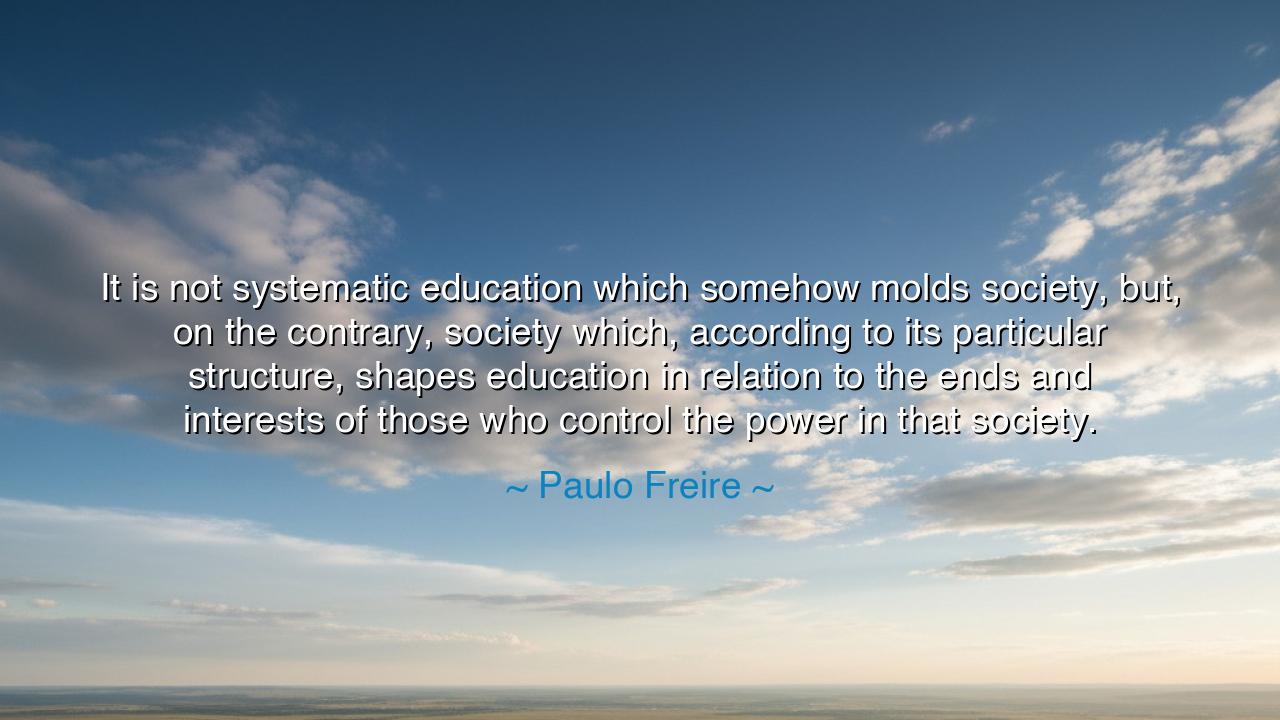
It is not systematic education which somehow molds society, but
It is not systematic education which somehow molds society, but, on the contrary, society which, according to its particular structure, shapes education in relation to the ends and interests of those who control the power in that society.






The great philosopher of liberation, Paulo Freire, declared with piercing clarity: “It is not systematic education which somehow molds society, but, on the contrary, society which, according to its particular structure, shapes education in relation to the ends and interests of those who control the power in that society.” In these words, he unmasks a truth that rulers have long hidden: that the schools and lessons of a people do not float freely, but are forged as instruments of those who govern, reflecting the ambitions of the strong and the struggles of the weak.
For many believe that education is a neutral gift, shaping citizens in virtue without bias. But Freire insists: it is not so. Every society fashions its education to preserve itself, to protect its rulers, to advance its chosen ends. In kingdoms of war, children are taught obedience and valor; in empires of commerce, they are taught calculation and profit; in republics of inequality, they may be taught resignation, cloaked in the language of opportunity. Power directs the pen as surely as it directs the sword.
History proves this again and again. In the days of ancient Sparta, the schools did not teach poetry or philosophy, but discipline, endurance, and warcraft, for the structure of that society was built upon conquest and the suppression of slaves. The education of the child was shaped entirely by the interests of the ruling warrior class. In contrast, Athens, priding itself on democracy and culture, taught rhetoric, philosophy, and the arts—yet still within bounds, for women and slaves were denied this same education, excluded by the very structure of power that defined Athenian society. Thus, Freire’s wisdom is revealed: it is society that shapes its schools, not schools that reshape society.
The modern world offers the same testimony. In colonial nations, the colonizers established schools not to liberate the minds of the oppressed, but to train them for servitude. Children of the colonized learned to admire the language and history of their rulers while forgetting their own. The purpose was not enlightenment but control. Here we see the heart of Freire’s argument: education is never apart from power, and if left unquestioned, it becomes a tool of domination.
Yet Freire did not despair; he spoke these words to awaken the oppressed to their own strength. If the powerful have used education to sustain injustice, then the people can reclaim it to build justice. This is the purpose of his “pedagogy of the oppressed”—to transform schools from instruments of submission into workshops of freedom, where students question, challenge, and rise. For though society shapes education, people, once awakened, can reshape society.
The lesson for us is sharp and urgent: never accept education as neutral. Ask always: who designed this system? Whose interests does it serve? If it fails to serve the poor, the excluded, the voiceless—then it is an education of oppression, not of liberation. But if it equips the marginalized to think, to speak, to act, then it becomes an education of hope.
Practical action lies before us. As parents, teachers, and citizens, we must strive to make education a weapon of freedom, not of control. Encourage questions rather than blind memorization. Teach history not only from the victor’s view, but from the voices of the oppressed. Demand schools that prepare all children, not merely the privileged, for lives of dignity and power. For in doing so, we weaken the grip of unjust structures and plant the seeds of a freer society.
Thus, let Paulo Freire’s words be remembered as both revelation and summons: “It is society which shapes education, according to the interests of those who hold power.” Know this truth, and act with courage. For only by reclaiming education from the hands of domination can a people become authors of their own destiny, and only then can society be remade in justice, equality, and freedom.






AAdministratorAdministrator
Welcome, honored guests. Please leave a comment, we will respond soon